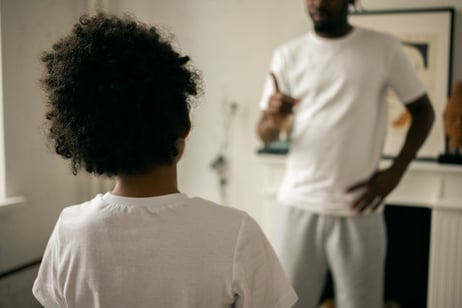 As a parent, discovering that your child is bullying someone else can be a difficult and emotional experience. It can be natural to feel shock, anger, and guilt, as well as worry about the long-term effects of your child's behavior. It is important to remember that children who bully often do so because they are struggling with underlying issues and may not fully understand the impact of their actions on others. As a parent, it is your responsibility to address the issue and help your child learn to behave in a more positive and respectful way.
As a parent, discovering that your child is bullying someone else can be a difficult and emotional experience. It can be natural to feel shock, anger, and guilt, as well as worry about the long-term effects of your child's behavior. It is important to remember that children who bully often do so because they are struggling with underlying issues and may not fully understand the impact of their actions on others. As a parent, it is your responsibility to address the issue and help your child learn to behave in a more positive and respectful way.
The impact of bullying on children
Bullying is a serious problem that can have long-term effects on the mental health and well-being of both the victim and the perpetrator. Children who bully are more likely to engage in other risky behaviors, such as substance abuse and criminal activity, as they get older. On the other hand, children who are victims of bullying may experience anxiety, depression, and low self-esteem. They may also struggle with academic performance and have difficulty making and maintaining friendships. It is essential to address the issue as soon as possible to prevent these negative outcomes.
Identifying the root cause
Before taking any action, it is important to understand the reasons behind your child's behavior. There are many possible reasons why a child may bully others, including low self-esteem, a need for attention, or a lack of empathy. It is essential to ask your child about their motivations and listen to their perspective. You may also want to consider seeking the help of a professional, such as a therapist or counselor, to gain a better understanding of the root cause of the bullying behavior.
Taking responsibility
Once you have identified the root cause of the bullying behavior, it is important to help your child take responsibility for their actions. This may involve acknowledging the harm they have caused to others and apologizing to the victim. It is also essential to have an open and honest conversation with your child about the impact of their behavior and the importance of treating others with respect. It may be helpful to have your child write a letter of apology or engage in restorative justice practices, such as mediating a conversation between your child and the victim.
Consequences and punishment
 While it is important to help your child understand the consequences of their actions, punishment alone is not enough to solve the problem. It is essential to also focus on teaching positive behaviors and providing your child with the tools and support they need to make better choices in the future. Depending on the severity of the bullying behavior, consequences may include loss of privileges, community service, or even legal consequences. It is important to set clear and consistent boundaries and follow through with consequences to help your child understand the seriousness of the situation. However, it is also essential to remember that punishment should be balanced with support and understanding.
While it is important to help your child understand the consequences of their actions, punishment alone is not enough to solve the problem. It is essential to also focus on teaching positive behaviors and providing your child with the tools and support they need to make better choices in the future. Depending on the severity of the bullying behavior, consequences may include loss of privileges, community service, or even legal consequences. It is important to set clear and consistent boundaries and follow through with consequences to help your child understand the seriousness of the situation. However, it is also essential to remember that punishment should be balanced with support and understanding.
Teaching empathy and compassion
One of the most effective ways to prevent bullying behavior is to teach your child empathy and compassion. Help them understand the perspective of others and encourage them to think about how their actions affect others. You can also model empathy and compassion in your own behavior and encourage your child to engage in activities that promote kindness and understanding, such as volunteering or participating in community service projects. It may Seeking help from professionals
If you have tried all of the above strategies and your child's bullying behavior persists, it may be necessary to seek the help of a professional. A therapist or counselor can help your child learn more effective ways of dealing with their emotions and teach them the skills they need to interact positively with others. Family therapy may also be helpful in addressing any underlying issues that may be contributing to the bullying behavior. It is important to remember that seeking help from a professional does not mean that you have failed as a parent, but rather that you are taking proactive steps to address the issue and support your child's development.
Tips for parents when your child is the bully
Here are some additional tips for parents on what to do if you discover that your child is bullying someone else:
- Stay calm: It is natural to feel upset and emotional when you discover that your child is bullying others. However, it is important to stay calm and approach the situation with a level head.
- Talk to your child: Have an open and honest conversation with your child about their behavior and the impact it has on others. Listen to their perspective and try to understand the root cause of their actions.
- Set clear boundaries and expectations: It is essential to set clear and consistent boundaries and expectations for your child's behavior. Make it clear that bullying is not acceptable and outline the consequences for breaking these rules.
- Encourage positive behaviors: In addition to setting consequences for negative behavior, it is also important to encourage and reinforce positive behaviors. Praise your child when they act kindly and compassionately towards others.
- Seek help if necessary: If you have tried all of the above strategies and your child's bullying behavior persists, don't hesitate to seek the help of a professional. A therapist or counselor can provide valuable support and guidance
Conclusion
Discovering that your child is a bully can be a challenging and emotional experience for any parent. However, it is essential to address the issue and take steps to help your child learn positive behaviors. This may involve identifying the root cause of the bullying behavior, taking responsibility for their actions, setting consequences and punishment, teaching empathy and compassion, and seeking the help of professionals if necessary. By addressing the issue and providing your child with the support they need, you can help them learn to treat others with respect and kindness.
Typically, children who bully are only doing so because something in their lives isn't serving them. Take our Breakthrough Area Assessment and see where it is that your child needs the most help to start to tackle the root cause of why they are bullying.


